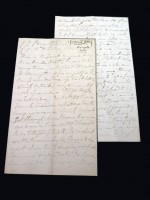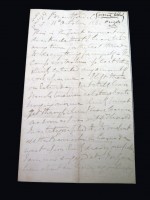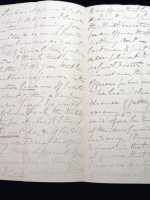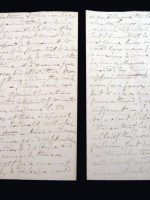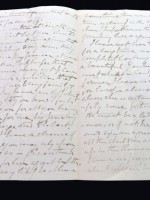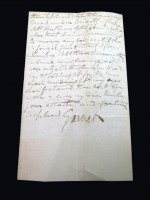Field Marshal Garnet Wolseley, handwritten letter from Brantford, Canada West, in 1866
Writing on promotions and his commanding officers
Author
Publisher
Printing Details
This is a handwritten letter from Garnet Wolseley (1833–1913), a major figure in the late Victorian British Army, sent from Brantford, Ontario, in 1866 in the aftermath of the Fenian raids of 1866 carried out by the Irish republican Fenian Brotherhood.
The letter is on eight sides on two sheets of paper measuring 18.5 × 11.5cm when folded, and has been folded vertically. It is written in ink on cream paper, and is to an unnamed maternal uncle of Wolseley's, living in Ireland (surname of Smith).
In the letter, Wolseley writes of his duties, "the camp was broken up last Saturday which entailed any amount of work upon me. I left there on Saturday but still have much business relating then to hanging over [?] which I must get through when I leave because as soon as I was out of Thorold I was telegraphed to, to inspect all the Barracks in Canada West upon which dreary occupation I am now engaged at." and moving on to Hamilton. the main topic of the letter is how sorry he is that he can't ask General Sir James Hope Grant (mentioned as Sir Hope) for help in getting promotion for his Uncle's son (and his cousin) George, who was, I think, serving in Madras, and how Sir Hope has no influence at Horse Guards. It appears Sir Hope was instrumental in getting another cousin (Robert) a promotion, but Wolseley is reluctant to risk a friendship on an officer unknown to those involved, stating "Over and over again I have read applications for promotion to Sir Hope and heard his remarks there on." He then talks about his personal life and how a lady he was involved with would require a non-Catholic husband to sign an agreement to have any children brought up in the Roman faith.
Here is the full text, square brackets have been used where I haven't been able to make out exactly what is written but it's only ever a word or two.
Brantford, CW [Canada West]
11th October 1866
[b][i]This is the first moment my dear Uncle that I have had any time for the last three days to do anything for myself – the camp was broken up last Saturday which entailed any amount of work upon me. I left there on Saturday but still have much business relating then to hanging over [?] which I must get through when I leave because as soon as I was out of Thorold I was telegraphed to, to inspect all the Barracks in Canada West upon which dreary occupation I am now engaged at. I only arrived here about an hour ago, having left London [Ontario] at 4pm and got here about 10pm. I leave again tomorrow evening for Hamilton and go on. I write these few lines now as you asked me to reply to you letter by return of post. I think that in my last letter I told you that Sir H Grant has now power in the promotion line. If I wrote to him about getting a company for your son George he would himself have to ask the Military Secretary for it, which I know he would not do & if he did, his asking would not be of any avail. It is a different affair for a Commander in Chief in Madras to give an appointment to an officer that he knows to the Quarter master general asking the Military Secretary for promotion for an officer that he knows nothing about. Sir Hope [General Sir James Hope Grant, served Madras] is the last man to [?] himself under a compliment to such a man as General Foster. Sir Hope has not even the [?] of officers for his own department. If he had, I should have a good chance of getting the first vacancy for myself, but as I have said before he has no influence at the Horse Guards, and if he had any, I know him too well, to imagine that he would exercise it for one that he doesn't know. He has nephews of his own in the army, one a subaltern & if he could get him promoted by asking for it, he would naturally do so. It is a great secret to know the proper & fit moment to make use of influential friends: to make appeals to them at the wrong time, is to ensure your being discarded altogether from the list of those whom they wish to serve. I have seen so much in official positions myself and intimately connected with men who have had patronage at their disposal that I am tolerably well up in such matters. Over and over again I have read applications for promotion to Sir Hope and heard his remarks there on.
[/i][/b]
If I thought for a moment that writing to Sir Hope would or could have the least influence or hasten George's promotion I would not hesitate a moment; but I know that to do so would not serve him one iota and would lose me a friend who is anxious to serve me when he has a chance, as he already showed by giving Robert an appointment. To ask a man a favor is one thing, but to ask a man to beg a favor from a third party is quite different. I applied to Sir Hope about Robert because I knew he had as Commander in Chief the power of providing for him, but now he has nothing whatever in his gift and I really would not on any account ask him to beg an appointment from that brute Foster for myself.
I have written at length on this subject but you should for a moment imagine that I was shirking doing something that was in my power at your request. I only hope that Providence may yet place me in such a position that I may be of use to my family & I may have an opportunity of proving to you how I feel towards you for all you have ever done for me, by pushing on both George and Robert. Whenever I have a chance of [?] you, you may reply upon my doing so. Please thank my aunt for her agreeable letter. I shall very likely be home sometime this winter, if not then certainly in the spring. When I shall have the pleasure of meeting her acquaintance.
I have not seen the [?] for a long time now, and have completely lost my head to a beautiful young [?] whom I met [?] in C..[?]. The former I hear is to leave for Europe almost at once where she is certain to be picked up by some fortune hunter: He must be a Catholick however, or if not, he must [?] and sign an agreement that all the children are to be brought up in the Roman faith – now I have no prejudices whatever about religion but I don't think I should like to have my brood under priestly influence. All this I have lately found out, as also that she has promised not to marry anybody until she is four or five and twenty I forget which. All these circumstances reduce my chance – If I were only a Catholick. Goodbye and good night for it is now near [?] lit & my eyes don't stand this sort of work – ever my dear Uncle your attached and affectionate nephew, Garnet.
Garnet Wolseley rose from shopkeeper's son to Field Marshal. His father, Major Garnet Joseph Wolseley of the King's Own Scottish Borderers (25th Foot), died when Garnet was seven depriving him of being educated in England. He was eventually commissioned into the 12th Foot in 1852, and saw a great deal of foreign service: Second Burma War, Crimea, Indian Mutiny, and the Second China War, which enabled him to display his exceptional abilities. his staff duty in Canada included him being in charge of training camps during the Fenian Raids, and as Deputy Quarter Master General. His reputation was enhanced by this service, added to which he wrote Soldiers' Pocket Book for Field Service (1869) which was an immediate success and remained in print for many editions, he collaborated with Cardwell on army reform, and it is even thought he was the model for W S Gilbert's "I Am the Very Model of a Modern Major-General" song from The Pirates of Penzance. His later career saw him in South Africa to repair the disaster after Isandhlwana, and then Egypt in 1882 to relieve General Gordon. Such was his reputation for efficiency that he was the inspiration the army phrase "all Sir Garnet" meaning all is in order.
Condition
The letter is in good condition. The ink is a little faint at the bottom of the pages but otherwise remains in strong readable condition.
Sold
